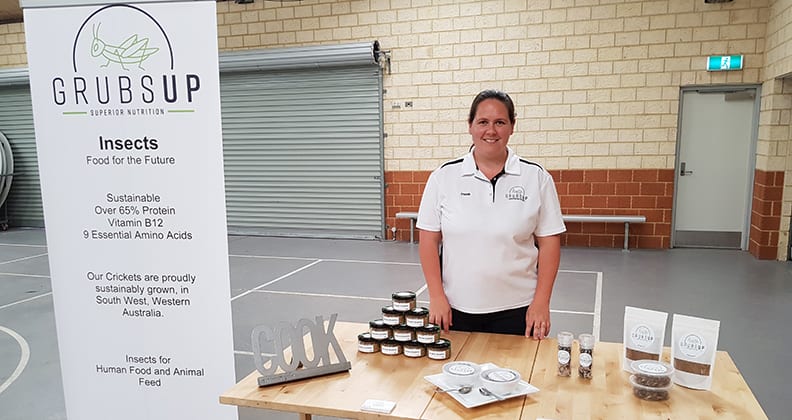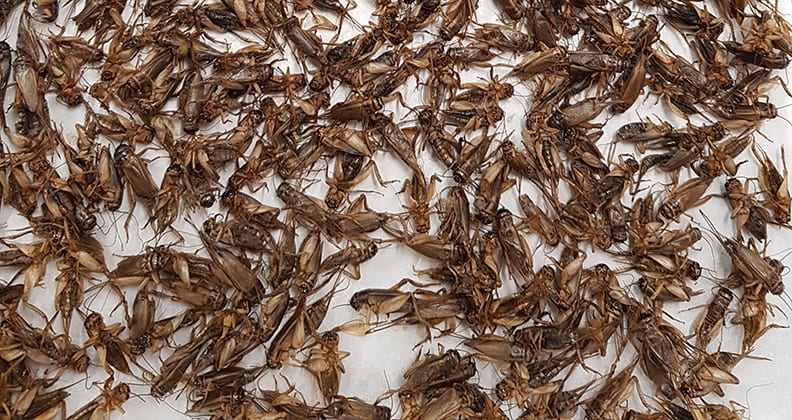We’ve all tried some kind of ‘strange’ food while travelling in a different county or at a distant relative’s Christmas lunch, but can you imagine eating something as unique as crickets as part of a balanced diet?
This is the vision of two agribusiness alumna, Paula Pownall and Amanda Abou Rjeily, who established Grubs Up in 2016, Western Australia’s first insect farm that specialises in producing crickets for human consumption.
Eighty per cent of the world’s population eat insects as part of a regular diet, yet the practice is still met with apprehension in Western countries. However, due to the rising cost of food, population growth, environmental pressures and higher demands for protein, the idea of insects as a sustainable food source is becoming increasingly palatable.
“With a passion for agriculture and primary industries, Paula understood that the pressures for change are paramount,” explains Abou Rjeily. “This, coupled with her experience in mosquito management, led her to ask the question, ‘Why can’t insects replace traditional sources of protein?’ The answer – yes, there is huge potential for producing insects as a protein source.
“After reading the UN document, Edible insects: future prospects for food and feed security, Paula discovered the fantastic nutrient profile of crickets and this led her to look further into commercial cricket farming.”

Grubs Up is based in Coolup, a small town about an hour’s drive south of Perth. Here, thousands of house crickets (Acheta domesticus) live in re-fitted laundry tubs stacked on top of one another. As well as saving space through this vertical farming system, Abou Rjeily says there are many other sustainable benefits to growing crickets.
“Crickets don’t need a lot of water or food and can live on fruit and vegetable scraps – so we’re actually using waste to grow a food source,” she says.
“They also contain a lot of nutrients for such a small animal. Crickets can provide us with essential vitamins and minerals such as amino acids, folate and vitamin B12, and are a great source of protein. 100 grams of cricket has up to 70 grams of protein.”
Comparatively, a 100 gram chicken breast contains roughly 30 grams of protein, and a 100 gram egg contains around 13 grams.
If the idea of eating crickets whole is a difficult one to swallow, Grubs Up sells the insects in powder form, and demand for the eco-friendly product is already outstripping supply. For those feeling more adventurous, Grubs Up also offers roast cricket spice grinders and a cricket dukkha.
Insect Insights:
- The practice of eating insects is called entomophagy.
- Pigs produce 10 to 100 times more greenhouse gases per kilogram than mealworms.
- Many cultures consume insects because they taste good, not because there is no other food available. Sautéed termites, for instance, taste like crispy bacon!
- The most commonly consumed insects are beetles (31 per cent), caterpillars (18 per cent), bees, wasps and ants (14 per cent), followed by grasshoppers, locusts and crickets (13 per cent).
So what do the hopping creatures actually taste like?
“Most people say they taste nutty or earthy but the responses vary greatly!” says Abou Rjeily.
“The public response has been largely very positive. We have actually been blown away with the public interest. Some people need a minute to get their head around what we are doing, but the vast majority are happy to have a taste and they are nearly always pleasantly surprised.”
With extensive backgrounds in farming, Pownall and Abou Rjeily hope to one day expand their business into the animal feed market, where crickets could be a cost-effective alternative to traditional feed sources for farm animals.
But, for now, Abou Rjeily says they are focusing on strengthening their current farm and are set to release some new menu options.
“Roasted mealworms will be up on the website shortly,” she says.
“Crickets will remain our focus for the moment, but you never know where things could end up. There are 1,900 species of edible insects out there!”
Pownall has been nominated to receive a 2018 40under40 award, which recognises the excellence of Western Australia’s young business elite and the contribution they are making to the future of the state.
Scholarship helped Pownall pursue study
Growing up in a regional area, Pownall applied for the Curtin Access Scholarship (now the Curtin STAR Scholarship) to help her relocate to Perth city to study. She says university would not have been possible without the economic support the scholarship provided, and she encourages all future students, particularly those from rural or regional areas, to apply for as many scholarships as possible if it means the chance to pursue their interests.
This story is part of Curtin’s Young Alumni Stories series where we celebrate the achievements of Curtin graduates 35 and under. Learn more about the Young Alumni Program.



